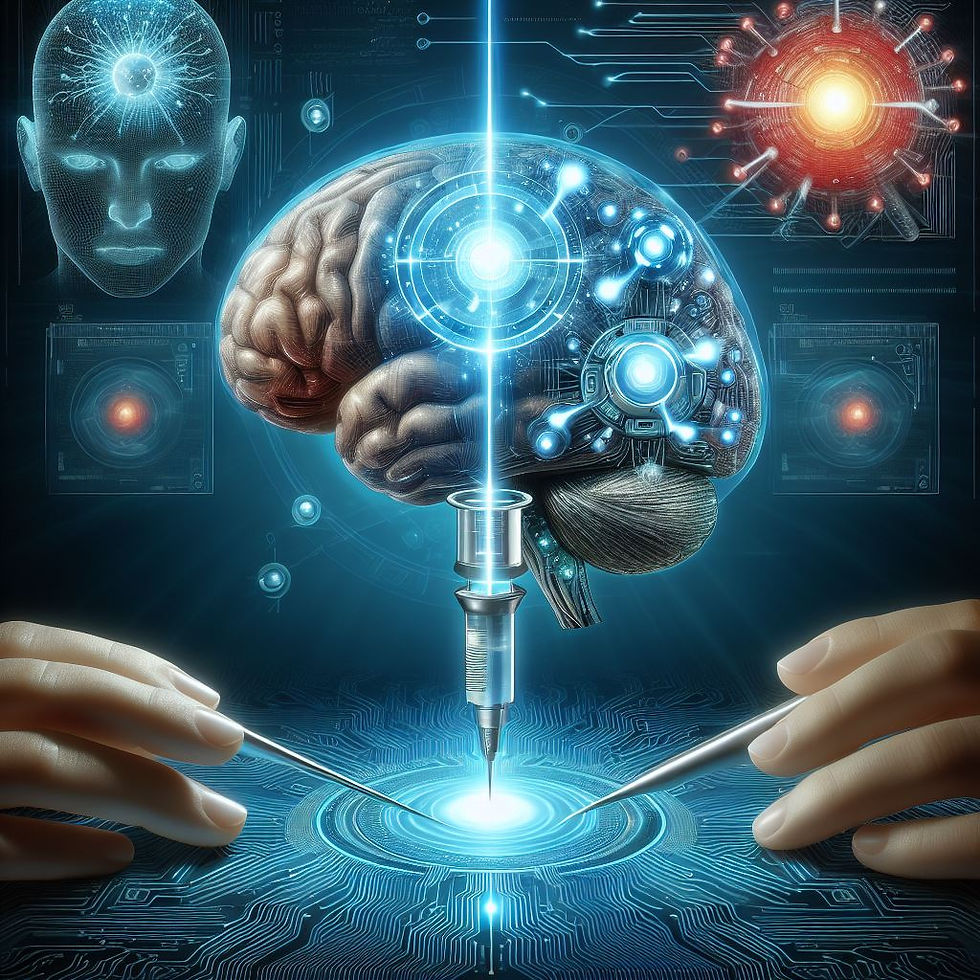The AI Revolution in Mental Health: Personalized Support at Your Fingertips
- MedAchievers Parliament
- Jan 20, 2024
- 4 min read
Updated: Jan 23, 2024

Imagine a world where your smartphone isn't just a device but a personalized mental health companion - a pocket-sized ally that understands your emotions and supports your well-being. That's the reality brewing at the intersection of AI and mental health. This isn't just about technological advancements; it's a seismic shift reshaping how we view and manage mental well-being. And the beauty lies in its ripple effect—it's not just about therapy sessions; it's about innovative solutions that touch every facet of our lives. So, let's swoop deeper. How exactly is this AI revolution unfolding, and how might it shape your life and society at large? Personalization Redefined Think of a mental health companion explicitly tailored to your needs—a digital ally that comprehends your emotional patterns, understands your triggers, and evolves alongside your journey. AI algorithms process vast amounts of data and pave the way for precisely this personalized support.
AI-powered applications can adapt and give guidance by analyzing user inputs, behavioral patterns, and even physiological indicators, offering interventions and coping mechanisms that resonate with individual preferences and personalities. This level of personalization is a game-changer, bridging the gap between generalized treatments and targeted adequate support.
Institutional use of AI in Mental healthcare As of my last update, several institutions and organizations in India have been pioneering the use of AI in mental health treatments, leveraging technology to enhance care and support for individuals facing various mental health challenges.
Several leading institutions in India are leveraging AI technology to transform mental health care. NIMHANS pioneers AI-driven chatbots and mobile apps, offering personalized support. iCALL by TISS uses AI chatbots to assist those facing emotional distress immediately. Fortis Healthcare integrates AI for accurate diagnostics and ongoing support via chatbots. MindPeers employs AI for the early identification of mental health concerns. These initiatives embrace AI to enhance accessibility, personalize care, and empower mental health professionals, addressing the increasing demand for quality mental health support across India.
AI's integration into mental healthcare
AI-Powered Chatbots and Virtual Assistants: AI-driven chatbots provide immediate support and guidance, available round-the-clock for users seeking assistance with mental health concerns. These chatbots adapt responses based on user inputs, offering tailored interventions and coping strategies suited to individual needs and emotional states.
Predictive Analytics for Early Intervention: Machine learning algorithms analyze diverse data sources like social media activity, speech patterns, and physiological indicators to detect potential mental health issues early. Early detection enables proactive interventions, offering timely support and preventive measures to mitigate the escalation of mental health crises.
Remote Monitoring and Telemedicine: AI interfaces with wearable devices to continuously monitor physiological and behavioral data, offering real-time insights into an individual's mental health status, facilitating tele-counseling and remote therapy sessions, breaking geographical barriers, and enabling individuals to access mental health care anywhere.
AI brings challenges too right ?The promising integration of AI in mental health care brings significant challenges that demand attention. Foremost among these challenges are concerns surrounding data privacy, ethical standards, and potential biases in algorithms. Ensuring the protection of user data while maintaining ethical practices remains paramount to building and retaining trust in AI-driven mental health solutions. The risk of algorithmic biases affecting the fairness and accuracy of assessments is a pressing issue, alongside the interpretability of AI decisions, which poses challenges in understanding how recommendations are formulated.
These systems must prioritize accessibility and inclusivity, bridging disparities and reducing barriers to access. Collaboration with regulatory bodies is imperative to establish ethical guidelines, and multidisciplinary collaboration among experts, professionals, ethicists, and policymakers is essential to navigate the complex ethical and practical considerations inherent in AI integration within mental healthcare. These modifications aim to foster a more robust, ethical, and inclusive framework, ensuring that AI enhances mental healthcare while preserving the core values of personalized, empathetic support delivered by human caregivers.
Real-Life Transformations
Integrating AI into mental health isn't just a theoretical concept—it's making tangible differences in people's lives. Consider the case of Sarah, a young professional battling anxiety. Traditional therapy was limited due to cost and her demanding schedule. Enter AI-powered mental health applications.
Through a combination of chatbot therapy and personalized coping strategies, Sarah found a consistent source of support. The AI chatbot immediately responded to her distress, guiding her through breathing exercises and mindfulness techniques tailored to her triggers. Over time, she reported a reduction in anxiety episodes and an increased sense of control over her emotions.
Moreover, research studies have demonstrated the efficacy of AI-driven interventions. For instance, a study conducted at a university clinic showed that an AI-based program significantly reduced depressive symptoms in participants over six weeks. The program adapted its strategies based on user responses, demonstrating the power of personalized interventions in addressing mental health concerns.
Empowering Both Users and Professionals
Beyond aiding individuals directly, AI tools also support mental health professionals in their practice. By analyzing vast datasets, these systems can identify trends and patterns, assisting clinicians in making more informed decisions about treatment plans and interventions. This augmentation of human expertise with AI insights enhances the overall quality of care.
Additionally, AI platforms assist in bridging the gap between demand and supply of mental health services. With waitlists for therapy often stretching months, these technologies offer immediate resources, reducing the strain on already burdened mental health facilities.
In essence, the scope of AI technology in mental healthcare in 2024 is expansive, encompassing precision interventions, early detection, accessible support, ethical frameworks, professional augmentation, enhanced user engagement, and continuous innovation. AI and mental health fusion promises a future where technology catalyzes personalized, moral, and inclusive mental health support.
.jpg)



Comments